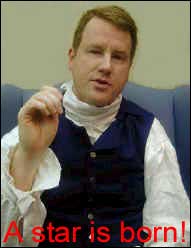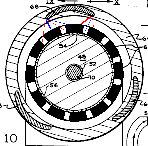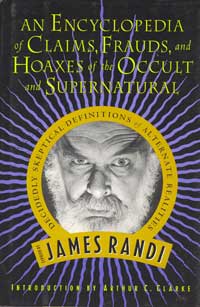
 The Amazing Meeting was a great success! We had 259 registrants, and the reaction is just now being measured via the evaluation sheets we issued. We've received a huge kudos from those who've been able to reach their e-mail. Individuals who managed to trap me in between my frantic to-and-fro trips between backstage and the auditorium were quite pleased. We'll most certainly do this again next year.
The Amazing Meeting was a great success! We had 259 registrants, and the reaction is just now being measured via the evaluation sheets we issued. We've received a huge kudos from those who've been able to reach their e-mail. Individuals who managed to trap me in between my frantic to-and-fro trips between backstage and the auditorium were quite pleased. We'll most certainly do this again next year.
A report will follow soon, but for now I'll tell you that I never had any idea of how many volunteers would show up a day early just to offer their help. Lt. Col. Hal Bidlack was a star of the show, running it with professionalism and dedication. He's a good friend and a firm supporter of the JREF.
Our weekend was dampened deeply by the shuttle disaster news, a bump that was hard to handle — but we managed. Hal got us over that as well as could be done, and we moved ahead. The "bad astronomer" Phil Plait was a sensation, and dear friend Michael Shermer raised appropriate hackles with his wonderful contribution. But a fuller report will be forthcoming....
 Okay, okay! I'm well aware that the Shakespeare quotation: "The fault, dear Brutus, is not in our stars, but in ourselves...." has nothing to do with Henry IV. It's from "Julius Caesar." A slip of my typing finger..... And in any case, I just can't figure out how Brutus got to know Henry....
Okay, okay! I'm well aware that the Shakespeare quotation: "The fault, dear Brutus, is not in our stars, but in ourselves...." has nothing to do with Henry IV. It's from "Julius Caesar." A slip of my typing finger..... And in any case, I just can't figure out how Brutus got to know Henry....
Vladimir Matveev, an inventor of Uzbek, Tashkent, self-described rather vaguely as "a specialist in electronics," claims to have created a new type of electrical generator that does not rely on the principle of electromagnetic induction, the principle on which all existing generators are based. His device, he says, uses "magnetic conductivity modulation," and he claims it will revolutionize industry, communications, households, and even the military. Did I just hear a cash register ringing....?
 Lest we think that his claim is less than legitimate, Matveev says his generator is different from an invention patented in 1973 by Howard Johnson of the United States. That's reassuring indeed. Mr. Johnson, unrelated to the ice cream mogul, claimed he'd discovered how to build motors that can run without input of electricity or any other kind of external energy. He did it by using only the energy contained in the atoms of permanent magnets, he said. Sure. Heard that before. But, knowing how easily the U.S. Patent Office issues patents for just about anything, we should not expect it to work, right? Also, had that 1973 patent been for a real invention, the 30 years that elapsed have not resulted in a single working prototype — though that hardly bothers the USPTO at all.
Lest we think that his claim is less than legitimate, Matveev says his generator is different from an invention patented in 1973 by Howard Johnson of the United States. That's reassuring indeed. Mr. Johnson, unrelated to the ice cream mogul, claimed he'd discovered how to build motors that can run without input of electricity or any other kind of external energy. He did it by using only the energy contained in the atoms of permanent magnets, he said. Sure. Heard that before. But, knowing how easily the U.S. Patent Office issues patents for just about anything, we should not expect it to work, right? Also, had that 1973 patent been for a real invention, the 30 years that elapsed have not resulted in a single working prototype — though that hardly bothers the USPTO at all.
In a very puzzling comment, inventor Matveev told reporters that his machine "generates electric energy of industrial frequency." Okay. Whatever that means, we'd just like to see it work, right?
Inventor Matveev, in a burst of generosity, has decided to "pass the invention on to all mankind," he said. Gee, thanks.
What was that I heard about looking a gift horse in the mouth...?
 Reader Mike Reid comments on the quotations about astrology that I suggested might be looked into. Here he makes an important point that I should have included:
Reader Mike Reid comments on the quotations about astrology that I suggested might be looked into. Here he makes an important point that I should have included:
In your most recent commentary, you invited your readers to attempt to verify several quotes from famous people who supposedly endorsed astrology. I don't think it's necessary to do that (though it might prove interesting, I admit). I think a more important line of investigation would be to question why we are being asked to accept as expert testimony the opinions of such luminaries of the astronomical community as Shakespeare, Ralph Waldo Emerson, and Mark Twain! Even if most or all of those quotes are correctly attributed, it is illogical to assume that just because some selected famous person pronounced his or her opinion on something, that opinion should be given more weight than actual evidence.If Hippocrates ("the most revered name in medicine") had spoken out against the germ theory of disease, would his eons-old objections outweigh the bounty modern evidence? If we are to take Milton and Mark Twain as credible authorities on the veracity of astrology, should we give equal weight to any remarks they may have made on, say, bridge building, differential geometry, or geology? If Britney Spears — an unparalleled expert at what she does — said that the Moon is made of green cheese, would our descendants have to contend with her expert opinion on the matter for centuries or millennia to come? I shudder to think.
Astrologers like to pretend that the fact that Kepler was an astrologer somehow lends credibility to their mumbo jumbo. Again, we have a credibility issue here. Kepler lived hundreds of years ago, when our species' knowledge of the universe was only a tiny fraction of what it is today. If Kepler had expressed the opinion that there were no more than ten thousand stars in the universe, would that be reason to believe it today? Similarly, the ancient Greeks, who were brilliant astronomers for their time, thought the Earth was flat, but no reasonable person interprets that as a good reason to believe that it is.
Thanks kindly. Keep making us think.
I'll try, Mike. Your observation is very strong, and welcome.
 Here's some really exciting news, folks! My 1995 book, "An Encyclopedia of Claims, Frauds, and Hoaxes of the Occult and Supernatural" is now up on the Internet, in its entirety! My good friend Chip Denman had contacted his buddy Stephen J. Goodson and asked him to facilitate this JREF project. Stephen, who attended The Amazing Meeting, announced to me that he'd just done so, and we're very, very, grateful for his considerable donation of talent and time to place the Encyclopedia at http://jref.sawco.com so that you can all now click in and look up subjects. Even more interesting is that we'll be able to change and add to the site, and we'll drop in the illustrations as well, as we get the time to do so. Thank you, Stephen. You're another good friend to whom we owe so much.
Here's some really exciting news, folks! My 1995 book, "An Encyclopedia of Claims, Frauds, and Hoaxes of the Occult and Supernatural" is now up on the Internet, in its entirety! My good friend Chip Denman had contacted his buddy Stephen J. Goodson and asked him to facilitate this JREF project. Stephen, who attended The Amazing Meeting, announced to me that he'd just done so, and we're very, very, grateful for his considerable donation of talent and time to place the Encyclopedia at http://jref.sawco.com so that you can all now click in and look up subjects. Even more interesting is that we'll be able to change and add to the site, and we'll drop in the illustrations as well, as we get the time to do so. Thank you, Stephen. You're another good friend to whom we owe so much.
Click in and enjoy!
Again, this is a very short update of this page. I apologize. I've just not had the time to run The Amazing Meeting, get ready for my second trip to Korea, and do all the regular chores at the JREF as well as prepare more material to post here.
I think that looking in on the Encyclopedia might occupy some of your time this week, and I'll look forward to receiving your comments, suggestions, and possible additions.
Love ya all....
